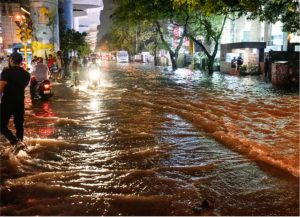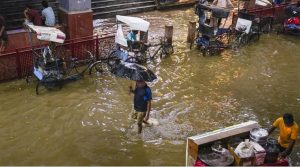 Flooding is a temporary overflow of water onto land that is normally dry. Floods can result from rain, snow, coastal storms, storm surges, overflows of rivers, and dam failure. Floods can be dangerous. People die by drowning when they don’t evacuate before floodwaters come or when they enter floodwaters. Floods can damage buildings and roads, cause power outages, and create landslides.
Flooding is a temporary overflow of water onto land that is normally dry. Floods can result from rain, snow, coastal storms, storm surges, overflows of rivers, and dam failure. Floods can be dangerous. People die by drowning when they don’t evacuate before floodwaters come or when they enter floodwaters. Floods can damage buildings and roads, cause power outages, and create landslides.
Urban flooding is emerging as a critical challenge for cities across the globe, with increasing frequency and intensity exacerbating the impacts on urban infrastructure, economies, and residents’ lives. As climate change accelerates and urbanization expands, the need for effective flood management strategies has never been more urgent.
The Rise of Urban Flooding
Recent events highlight the growing severity of urban flooding. Cities like Delhi, On July 27, three students allegedly died and several were trapped, after a nearby drain burst which led to flooding in the basement of a UPSC coaching institute in Old Rajinder Nagar.
In a devastating turn of events, torrential rains have led to severe flooding in several parts of the region, resulting in the tragic loss of three young lives and substantial damage to a renowned educational institute at old rajendra nagar that has long been a beacon of hope for UPSC aspirants. Their untimely deaths have sent shockwaves through the community, leaving family members, friends, and fellow students in deep mourning. The loss of these young lives represents not just a personal tragedy for their loved ones but also a significant loss for the nation, which was poised to benefit from their future contributions as civil servants.
Urban flooding occurs when city landscapes, often characterized by extensive impervious surfaces such as roads and buildings, are overwhelmed by heavy rainfall or rising water levels. Unlike rural areas where natural landscapes can absorb excess water, urban environments channel water into drainage systems that are frequently inadequate or poorly maintained. This mismatch between water flow and drainage capacity can result in significant flooding.
Causes of Urban Flood :
Urban flooding can result from a variety of factors, often interacting in complex ways. Here are some common causes:
- Heavy Rainfall: Intense or prolonged rain can exceed the capacity of drainage systems, leading to overflow and flooding.
- Poor Drainage Systems: Inadequate or poorly maintained drainage infrastructure can fail to channel water effectively, causing backups and floods.
- Impervious Surfaces: Concrete and asphalt surfaces reduce the ground’s ability to absorb water, increasing runoff and the likelihood of flooding.
- Urbanization: Development often replaces natural land with impermeable surfaces, disrupting the natural flow of water and increasing flood risk.
- Blocked Drains: Accumulation of debris, trash, or sediment in drainage systems can obstruct water flow and lead to localized flooding.
- Sewer Overflows: Combined sewer systems, which carry both sewage and storm water, can overflow during heavy rain, leading to flooding and contamination.
- Climate Change: Changes in weather patterns and increased frequency of extreme weather events can exacerbate flooding issues in urban areas.
- Topography: Low-lying or poorly graded areas can be more susceptible to flooding, particularly if natural water flow is obstructed or redirected by urban development.
- Construction Practices: Poor construction practices, such as improper grading or blocking natural water flow paths, can contribute to increased flood risk.
- Lack of Green Spaces: The absence of parks or green areas that can absorb and manage storm water can increase runoff and flooding risk.
Addressing these causes often requires a combination of improved infrastructure, better urban planning, and proactive maintenance to mitigate flood risk.
Urban Flood: DO’s and Don’ts
 NDMA (National Disaster Management Authority ) which is headed by the Prime minister of India and prime apex body for disaster management in India is notify the followings Do’s and Don’ts for prevention from the losses which causes from flood.
NDMA (National Disaster Management Authority ) which is headed by the Prime minister of India and prime apex body for disaster management in India is notify the followings Do’s and Don’ts for prevention from the losses which causes from flood.
Before floods
- Do not litter waste, plastic bags, plastic bottles in drains
- Try to be at home if high tide and heavy rains occur simultaneously
- Listen to weather forecast at All India Radio, Doordarshan. Also, messages by Municipal bodies from time to time and act accordingly.
- Evacuate low lying areas and shift to safer places.
- Make sure that each person has lantern, torch, some edibles, drinking water, dry clothes and necessary documents while evacuating or shifting.
- Make sure that each family member has identity card.
- Put all valuables at a higher place in the house.
 In the Flood Situation
In the Flood Situation
- Obey orders by government and shift to a safer place.
- Be at safe place and they try to collect correct information.
- Switch of electrical supply and don’t touch open wires.
- Don’t get carried away by rumors and don not spread rumors.
After Floods
- Drink chlorinated or boiled water.
- Take clean and safe food
- Sprinkle insecticides in the water ponds/ stagnant water.
- Please cooperate with disaster survey team by giving correct information.
DO’s
- Switch off electrical and gas appliances, and turn off services off at the mains.
- Carry your emergency kit and let your friends and family know where you are going.
- Avoid contact with flood water it may be contaminated with sewage, oil, chemicals or other substances.
- If you have to walk in standing water, use a pole or stick to ensure that you do not step into deep water, open manholes or ditches.
- Stay away from power lines electrical current can travel through water, Report power lines that are down to the power company.
- Look before you step-after a flood, the ground and floors are covered with debris, which may include broken bottles, sharp objects, nails etc. Floors and stairs covered with mud and debris can be slippery.
- Listen to the radio or television for updates and information.
- If the ceiling is wet shut off electricity. Place a bucket underneath the spot and poke a small hole into the ceiling to relieve the pressure.
- Use buckets, clean towels and mops to remove as much of the water from the afflicted rooms as possible.
- Place sheets of aluminium foil between furniture wet carpet.
 Don’t’s
Don’t’s
- Don’t walk through flowing water – currents can be deceptive, and shallow, fast moving water can knock you off your feet.
- Don’t swim through fast flowing water – you may get swept away or struck by an object in the water.
- Don’t drive through a flooded area – You may not be able to see abrupt drop – offs and only half a meter of flood water can carry a car away. Driving through flood water can also cause additional damage to nearby property.
- Don’t eat any food that has come into contact with flood water.
- Don’t reconnect your power supply until a qualified engineer has checked it. Be alert for gas leaks – do not smoke or use candles, lanterns, or open flames.
- Don’t scrub or brush mud and other deposits from materials, This may cause further damage.
- Never turn on ceiling fixtures if ceiling is wet. Stay away from ceilings those are sagging.
- Never use TVs, VCRS, CRT terminals or other electrical equipment while standing on wet floors, especially concrete.
- Don’t attempt to remove standing water using your vacuum cleaner.
- Don’t remove standing water in a basement too fast. If the pressure is relieved too quickly it may put undue stress on the walls.
Learning from the incident
- Basement never used for public gathering or commercial purpose.
- Building ground floor level is required to be higher than the level of road.
- Considering the safe evacuation at least two exist should be there
- Fire Exits should not be locked manually or electronically in any case
- Exits should be opened at road side.
- Never Use of Lift during water logging in the basement.
- Never use of Electricity while water logged inside premises.
- Call and inform the emergency services immediately
- Inspect and inform the concerned authority regarding nearby water logging area.
Er. Amit Kaushik,
BSES Yamuna Power Ltd., Delhi























































